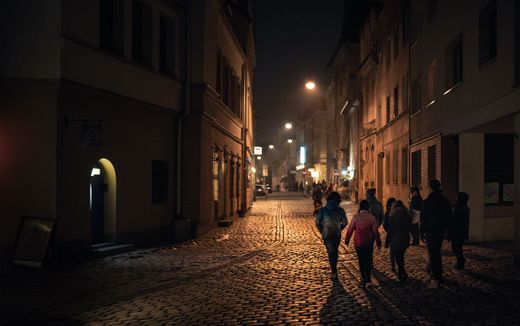Weekly column: Even for Russians, Dostoevsky is not an easy read
17-12-2021
Christian Life
Nina Koryakina, CNE.news

Metro station Dostoevskaya in Moscow. Photo EPA, Sergei Ilnitsky
Christian Life
As if we, Russians, need an extra reason to speak of Dostoevsky, the epitome of ‘the mysterious Russian soul’, this year marks 200 years since his birth. Not that he lacks publicity or attention – at least, not in Russia – yet I think each of us could benefit from pondering on Dostoevsky, let alone reading his books. Let me sell the idea to you.
You may feel like I am at an advantage here: after all, Dostoevsky (1821-1881) spoke and wrote in my native Russian. Yet his language is so complicated, so different from the rest of the Russian classics, that it presents an obstacle even to us, Russians.
By complicated, I do not mean complex grammar or terms only a few learned ones would get; his writing –how should I put it?– is not an easy read. It is not polished and smooth; it is not a well-paved road meant for a fast ride. It’s more like coming for a picnic and seeing that your guide is all prepped for rock climbing.
Nina Koryakina (1973) lives and works in Moscow. She is at least the fourth generation of Muscovites on the maternal side and even worse on the paternal.

She lives her life in Russian, English, and Spanish. She makes a living of teaching English as second language (ESL) at a university, while her passion is translation and conference interpreting – and yes, she makes a living of that, too.
Nina has been raised by her three kids; together they have a Devonrex cat.
You get through a rough path, you climb a couple of rocks, you get wet, you get frustrated, your well-packed sandwiches get squished and fall into the river, but at the end of the day, it doesn’t matter. You came for a picnic and never got to eat. But you got a whole experience that made you forget about hunger.
I know I didn’t explain a thing, but that’s Dostoevsky. He’s not for explaining.
Books were my best friends
I remember my first encounter with Dostoevsky. I was at school, and he was part of the programme. I was an avid reader; I read far more than my peers – in fact, books were my best friends. So, I did not have any sense of dread at encountering yet another Russian classic. Big deal, thought I. Bring it on.
I couldn’t have been more wrong.
The depth and naked honesty of Dostoyevsky scared me. I was invited to deep diving only to realise I could but dog paddle. I went through a few pages and… quit.
I had never quit a book before, never in my life. But in just a few pages, Dostoevsky, with his usual simplicity and honesty, showed me how inexperienced, how immature I was, how ill-prepared to face the big questions of life. So, I realised Dostoyevsky would have to wait. Or, rather, I would have to wait for Dostoevsky. And I did, coming back to discover him in my thirties. One of the best reading decisions I’ve ever made.
Dostoevsky is an experience
What is Dostoyevsky for, then, if he’s not very readable and not very explainable? He is to be experienced. He will not only talk to you, but he will talk of you, and sometimes he will talk for you. He will tell you of your own deepest secrets, even the ones you are not aware of.
He will wake you up to the darkness within so that you can see the light. He will confess to you in such a way that you will feel like you have never confessed anything to anyone – only to find out that he has just done the confessing for you. He will shock you by the depth of our depravity – and inspire you with the heights of love and sacrifice we are capable of. Pride and humility, apathy and zeal, hopelessness, and faith – Dostoevsky has it all. And he finds it all in each of us.
He writes about you and me
Dostoevsky is about being brutally honest with oneself. Dostoevsky is about emptying our closets of all the skeletons and whatnot. Dostoevsky is about crying out to God when you don’t believe, being angry with God while seeking His forgiveness, searching for God that would accept those who reject Him. Dostoevsky is about finding yourself a part of the crowd that leaves Golgotha with a contrite heart, having realised that you had just crucified your Saviour.
Dostoevsky is deeply personal. He may write about him or her, but it is never about a third person. He is writing about himself, writing about you and me. It is never about Raskolnikov – it is about the Raskolnikov in me: my shame, my pride, my guilt and my repentance.
But Dostoevsky never leaves me alone in this torment. He is always there with me, for this torment is his as well as mine. We are confessing to each other in a very James 5:16 sense of the word. We are confessing to be healed. We are confessing to be prayed for and to pray for the other who might be confessing the same.
Moment to meet has come
All in all, if you’ve never had your encounter with Dostoevsky, maybe the moment has come. He, like our famous Russian soup, borsch, could be an acquired taste, but you have to try at least. He’ll blow your mind in various ways, to be sure, but so does the Bible when you take it seriously.
Related Articles





